- Home
- Neal Asher
Zero Point (Owner Trilogy 2) Page 2
Zero Point (Owner Trilogy 2) Read online
Page 2
‘Not just that,’ Anderson continued, ‘Argus itself is currently beyond the orbit of the Moon and heading away.’
‘I see,’ said Serene, trying to keep her voice in keeping with her name. ‘So Breckon, Mouheed and Rocheur weren’t at their respective Inspectorate HQs when this went down?’
‘All of them at home.’
Serene considered all that had been happening prior to her diving under her desk at the conference. The rebels had penetrated Govnet at an unheard-of level, and taken control of all of Earth’s military resources. She now suspected she knew what that fire over to her right might be. Clearly, the rebels had dropped the Argus Network satellites on Inspectorate HQs all across Earth, and that smoke cloud rose from HQ Northeast. It seemed the rebels had also either stolen Argus Station, or dispatched it off into the Solar System.
‘Keep gathering data and be sure we have as much capacity as possible for when Govnet comes back online,’ she said. ‘You’ve checked our system for comlife?’
‘Comlife . . . yeah, had to be. Our system was visited, and a lot scrambled – someone knew every damned access code. We’re now fully hard-system; I’ve changed all the codes and closed doorways it left behind.’
‘Okay . . . do you still have outside power there?’
‘No, the Sizewell fusion reactors did a safe shutdown. We’re using the wind turbines.’
‘Good enough,’ she replied.
She didn’t need a great deal of electrical power for what she intended. The signal would transmit virally through Govnet, to be rebroadcast from any available radio transmitter. Not too many of them would be needed either, because those ID implants it reached would then rebroadcast it again, and it would spread, like a plague.
Argus
The scanning helmet completely covered Saul’s head and face. Usually this would not have been disconcerting for him, for he could have kept watch through the cams pointing down from the ceiling, or through any nearby robots like the spider-gun squatting over by the door into the laboratory. However, after his attack on Committee rule on Earth, it seemed almost as if the sun itself had registered its protest at the destruction he had wrought.
Just hours after Argus Station swung around the Moon in a low-fuel course change, then fired up the Traveller VI to begin its non-conjunction course for Mars, the solar storm had begun. The last sight Saul had of the sun was a flare arcing out and back down – forming a bridge large enough to roll entire worlds around – then it had been necessary to put up the station’s EM field to prevent those inside being roasted by the sleet of radiation. Only the optical telescopes still functioned, and their images weren’t the best. But this also meant that right now he could not, without plugging an optic directly into his skull, access the station’s computer system and thereby any cams or robots.
‘Your synaptic density is about twice that of a normal human being,’ said Hannah.
‘Do you have all the data you need?’ he asked.
‘You don’t like being blind,’ she remarked.
‘I do not.’
‘Yes, you can take off the helmet.’
Saul quickly lifted it from his head and gazed across to where Hannah had ensconced herself before an array of screens. Did she look unwell? Did she still hate him for the task he had given her? It was difficult to tell. He swung his gaze across all the equipment occupying her laboratory, to the viewing window into her adjoining surgical theatre. He’d known from the moment he came in here that she had been preparing for that ghoulish chore.
Arcoplex One, which was one of the three cylinder worlds extending like thick spokes from the centre of Argus Station to the outer ring, contained seventy delegates, along with Chairman Messina. They were all guilty of murder, whether personally guilty or having issued orders for mass exterminations. They had been given a choice of life or death, though in order to live they must have their minds erased. None had chosen to die, and Hannah must now carry out the chore of implanting specially designed biochips that changed neuro-chem, zapped synapses and made new connections – wiping a human brain like a magnet drawn across an old magnetic tape. Of course, mindless humans were a resource drain they could not afford here, so Hannah intended to make the wipe quite specific, so that a lot of what had been inculcated into them as children and as teenagers would not be erased. They wouldn’t lose their toilet training, for example, or the ability to communicate, or much of their early education. Saul supposed they would end up much like children, though like children with little urge to play.
He now swung his attention to the screens ranged before her.
Here were pictures of his brain, energy statistics, data-flow diagnostics and much about the medical side of what had happened to him. One screen showed the bio interface as a blur at the centre of the neurons it had grown. Since those neurons and the synaptic connections they made were based on his own genetic blueprint, they weren’t distinct under resonance scan until Hannah ran a computer program to utilize data that had been stored in the hardware in his skull. This provided the scan image of his brain before she had installed the interface and its related hardware and, now able to make the distinction, the program coloured new growth in a vibrant green. The interface looked like the core of an epiphyte, its branches spreading throughout his skull and even penetrating down into his spine.
Mistletoe in my head, Saul thought, but then remembered that plant was poisonous so decided to drop this analogy.
‘It grew too fast – there are imbalances,’ she said.
‘Inevitable – since it responded to mental pressure, and I was under a lot of it. The epiphyte underwent forced growth. What are the dangers?’
She sat back from her consoles, wiping a hand down her face. ‘Epiphyte, yes, quite . . .’ she said, and then continued, ‘The blood supply in your skull is struggling to keep up. You’re growing new capillaries, and the old ones are expanding, but still demand is outstripping supply . . . You’re going to need supplements.’ She stood up and walked over to a cupboard, took out an electrical pill dispenser and began inserting tubes of pills. ‘You’re eating?’
‘There hasn’t been much time to, but, yes, every opportunity I get. I’m always hungry.’
‘To be expected,’ she said. ‘I would say you are near the limit of what your body can handle without further assistance and, frankly, what it’s handling is already beyond the limit of a normal human body. You should be dead by now.’ She was referring to the things he had done to himself before Smith wiped out his original mind. Using nano-machines and tailored viruses, he had upgraded what nature had given him. As a result he healed faster now, adapted faster, his immune system was boosted.
‘Any further growth and any increase in processing will put you in danger of embolism. You are also at the point of diminishing returns, due to cell starvation.’ She finished filling the dispenser and now began programming it.
‘So what can we do?’
‘We can install carotid valves to control the blood pressure in your skull. There are ways of upping your red-corpuscle count, and I can run nutrients straight into your bloodstream. However, the best option would be for you to shunt some of that processing outside yourself.’
‘Which I already do – since a lot of me is now in the computer systems of this station.’ But, of course, he knew that wasn’t what she was talking about.
‘But you’re disconnected from it right now.’ She shook her head. ‘That’s beside the point, anyway. You do run processing outside yourself, but you mirror and map a lot of it inside your organic brain, because you’re translating from machine code to organic processes. Though what you can do outside yourself is becoming increasingly complex, your organic brain is still the control centre.’ She paused, losing her doleful expression to a glint of maniacal enthusiasm, as she always did when venturing to the cutting edge of her research.
‘Exolocation,’ he said, unable to resist second-guessing her.
She turned towards him. ‘Of course, you already know
that.’
‘How would you go about it?’ he asked.
‘Do you need to ask?’
‘Yes, because I’ve decided to give you the opportunity to tell me about it.’
‘Big of you.’ She handed over the dispenser.
‘Do go on.’
‘I would take samples of your brain tissue, place them in nutrient-infused aerogel matrices and, through carbon micro-tubules, feed in oxygen and further nutrients.’
‘How would you take out the waste?’
‘With simplified leucocytes and biomechanical kidneys.’
‘And this would work?’
‘There would be failures, which is why I’d first grow maybe three or four samples.’
Saul smiled. It was a thoroughly fascinating prospect: organic extensions to his brain, extra brain mass grown from his own brain tissue and maintained in portable units. He hesitated. There was so much still to do and he now wanted to get back to his room in Tech Central, plug an optic into his skull and get on with it. However, he understood himself well enough to know that his anxiousness to leave stemmed from how vulnerable he felt when unable to connect into the systems around him.
He relaxed, sat back. ‘Take your samples.’
Earth
During World War Two the British government had developed radar here and, during the ensuing cold war, atomic weapons research had been sited here. Throughout World Wars One and Two, and until the nuclear age, a huge amount of bomb development had been conducted here too. Serene felt that her own work here was thoroughly in keeping with this place’s history.
Orford Ness extended parallel to the coast, from what had once been the town of Aldeburgh, but was now one of the big coastal cities incorporating Orford and Leiston on either side. Over the previous century the spit of land had grown, tidal action heaping up more shingle, while concrete rafts and docks were built out to sea to support first the maintenance of the wind farms, then the spread of fish farms. Upon all this, the Complex itself had been built, also bridging inwards to the land.
Serene took her aero over Aldeburgh itself and sucked in a sharp breath at the extent of the devastation, and again resisted the temptation to seek data from Govnet, which, only ten minutes previously, had begun its secure start-up. She would wait until she was within the Complex and able to ensure that any precautions that could be taken were made.
The city’s population had mostly consisted of government employees running the sub Northeast administration, but now it seemed that the only movement visible down there was flocks of ragged gulls scavenging in the bloody streets, or fires eating through the office blocks. However, there would be more movement some time hence. She had already seen hordes of zero assets, from the massive sectors of the Cambridge sprawl, slowly tramping about in the previously forbidden agricultural lands of Mid-Suffolk. She had also seen much similar movement across Essex.
Though there was some damage in the Complex, it wasn’t anywhere near as bad as the inward city. She noted people gathering on the landward side of the Ness channel, and she wondered if at least some of them might be her missing staff. Certainly, even if they weren’t, she would be needing recruits.
Beyond the Complex, the sea was chequered with decaying fish farms extending all the way out to the ragged towers of wind turbines, for most of which there had been neither the funds nor the inclination to repair. However, five turbines were now working again, powering her Complex now that the Sizewell reactor was down – another precaution she had taken earlier and further affirmation of what now seemed to be her destiny.
Coming in over the aero-port, she circled for a moment while deciding where to land. She could see bloodstains on the carbocrete and, parked off to one side, a forklift with its tines loaded with corpses stacked like logs. Then, as she began her descent, she saw Anderson striding out with two uniformed security staff behind him. For a second she didn’t like that, didn’t like to see him accompanied by armed men. But in the end she must trust, at least to a limited extent, someone. She took her aero down and landed, shut down its engines and headed for the door.
‘You’re gathering data?’ she said as he held out a hand to assist her down from the aero.
‘As we speak,’ he said, looking grim and slightly distracted – probably by a feed issuing from his fones and the implants in his skull. ‘Chairman Messina is gone, along with most of his pet delegates.’
‘What?’
‘We’re still trying to get the story clear . . .’ Anderson paused, and seemed slightly stunned. ‘You said we were hit hard, but I wonder if you know just how hard.’ Once she was down on the carbocrete he gestured inland. ‘All across Earth, it’s the same as what you probably saw over there. We estimate that over two-thirds of the upper Committee Administration, Military, Executive . . . everything . . . dead.’
She had suspected something like this, had seen some sign of it during her flight here, made her calculations on that basis, but now actually being told she was right jerked her to a halt. For a second she just wasn’t sure what to say next, then, ‘Zero assets and societal assets, people outside of the Administration?’
‘Mostly untouched – massive casualties from aero and scramjet crashes and infrastructure collapse, of course, but generally the zero-asset death rate is down on the previous quarter, while our programs predict that societal assets will show a greater propensity for survival now.’
She gazed at him assessingly. ‘Then we must ensure that the former don’t swamp us, as that stupid sectoring idea will have turned them more hostile than before.’
He nodded, understanding perfectly.
‘So, now tell me about Messina,’ Serene asked, as they began to head towards the Complex’s entrance.
‘The rebellion was widespread and damaging, but had no chance of success, and was just a distraction while rebels seized Argus Station. When that space plane crashed at Minsk, another was in the process of being stolen—’
‘Yes, I know that,’ Serene interrupted. ‘Who exactly are – or were – they?’
‘It’s a little confused at the moment.’ Anderson pushed the door open ahead of Serene and held it for her. ‘Initially we have reports that the leader of this group, this “Revolutionary Council” was someone called Malden, who escaped IHQ London.’
‘Seems plausible, since IHQ London was nuked.’ She strode ahead down the corridor, glancing through one door into a big clean-assembly room. Ahead lay the chip-etching plants and the biochip division, all self-contained, run on robotics controlled from the Oversight Room. Her operation here had been very efficient. Her future – and much larger – operation would be more efficient still.
‘Yes, but it seems this Malden died during the attempt to seize Argus Station, and Station Director Smith had regained control. This did not stop Messina summoning his delegates and taking an assault fleet from the Australian Outback spaceport.’
Serene smiled nastily. ‘Messina wanted an excuse to take Smith down anyway, and he wanted to shift his powerbase offworld.’ She paused, suddenly confused. ‘So Messina controls Argus now?’
Anderson shook his head. ‘The last we heard was from assault-force communications. It seems someone else seized control of part of the station, and started up the Mars Traveller Engine at just the right time to wipe out most of Messina’s force. It seems likely that it was this man who brought down the satellite network and turned our own guns against us.’
‘Do we have a name?’
‘We do – he’s called Alan Saul.’
‘Any data on him?’
‘Just a fragment from IHQ London: a disposal order sending him to the Calais incinerator.’
Serene wasn’t sure why that got to her. She shivered.
Soon they reached the armoured doors leading into Oversight, which slid open ahead of her at some unheard command from Anderson. She walked inside and surveyed all those personnel sitting gathering data at the various consoles.
‘Administration survivor
s – anything useful?’ she asked abruptly.
‘North Region survivors with available transport are heading to the enclaves on the Isle of Mull, though some are making for Inspectorate HQ Glasgow – one of the few to remain untouched. Those in the Midlands are heading to those places as well, or to the offshore algae farms. The same pattern is being repeated all across Earth – Committee survivors with access to transport are trying to put water between them and the zero-asset hordes.’
‘A sensible move, but one of limited duration. Have you managed to contact any European delegates?’
‘None at all.’
‘Then I have authority over the European Region, so summon those on Mull and elsewhere here.’ She paused to strip off her jacket and sit at her own console. ‘We’ve got some organizing to do.’ She glanced over at the door leading into her apartment, telling herself she would head there sometime soon, clean up, then pause and ready herself for what she must do next. However, it would be ten days before she passed through that door for anything more than short power naps, to use the toilet or to gulp down another handful of stimulants.
Mars
The news from Earth was now completely non-existent, but even the dismal picture they had obtained, before the solar storm blew up, lacked impact, especially since they had been on the very knife edge here, where, for survival, even air had been rationed. For five days after Varalia Delex blew out the windows of Hex Three at Antares Base on Mars, it had been necessary to divert a large portion of the reactor’s output to melting Martian ice and electrolysing the water for its oxygen. It had also been necessary to cut all non-essential power usage, even to cut heating in all non-vital areas. During those five days a total of eighty-two personnel were confined to their cabins with the instruction to stay in bed and breathe shallowly – to remain as inactive as possible without being dead. It had been close, and luckily no one had actually achieved that state of total inactivity. Now they had power to spare again, and they were using it.
Var walked slowly ahead of her two companions along the roof of the wing adjoining Hex Four, finally coming to a halt at the edge of the building. The construction robots, newly fired up, were dipping and weaving inside and outside the hex like a flock of iron swans. Gazing at this activity, she allowed herself to feel hope, perhaps for the first time since the Committee had sentenced them to death. In deciding to scrap the Traveller spacecraft through the bubblemetal plants of Argus, to shut down further Traveller construction and thus abandon the personnel here on Mars, the Committee had expected the eventual demise of her and her fellows to be almost certain. To push that demise to complete certainty, it had instructed the political officer here to thin out the population, ostensibly because this would enable the remainder to survive, but really because the resulting loss of expertise would ensure that those left behind didn’t live. But Political Officer Ricard and his staff were all dead, because Var had killed them all.

 The Bosch: A Novella (Polity Universe)
The Bosch: A Novella (Polity Universe) Jack Four
Jack Four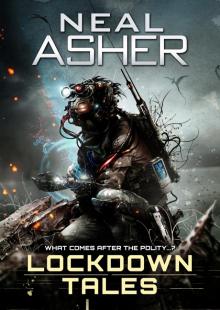 Lockdown Tales
Lockdown Tales The Warship
The Warship Line War
Line War Total Conflict
Total Conflict The Departure
The Departure Owner 03 - Jupiter War
Owner 03 - Jupiter War Polity Agent
Polity Agent Prador Moon
Prador Moon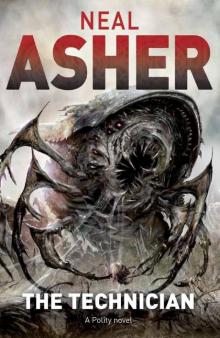 The Technician
The Technician Hilldiggers
Hilldiggers Gridlinked
Gridlinked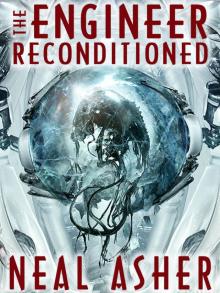 The Engineer ReConditioned
The Engineer ReConditioned Dark Intelligence
Dark Intelligence The Soldier: Rise of the Jain, Book One
The Soldier: Rise of the Jain, Book One Shadow of the Scorpion p-2
Shadow of the Scorpion p-2 The Skinner
The Skinner The Soldier
The Soldier The Gabble p-13
The Gabble p-13 The Gabble and Other Stories
The Gabble and Other Stories The Parasite
The Parasite The Other Gun
The Other Gun The Line of Polity
The Line of Polity Zero Point (Owner Trilogy 2)
Zero Point (Owner Trilogy 2)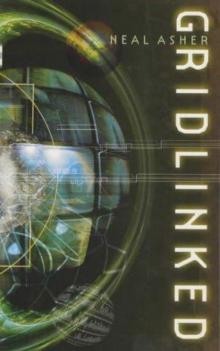 Gridlinked ac-1
Gridlinked ac-1 Prador Moon p-1
Prador Moon p-1 Infinity Engine
Infinity Engine Mindgames: Fool's Mate
Mindgames: Fool's Mate Orbus
Orbus Africa Zero
Africa Zero Line War ac-5
Line War ac-5 Brass Man
Brass Man The Departure to-1
The Departure to-1 Cowl
Cowl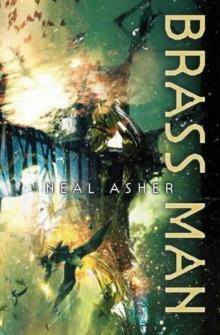 Brass Man ac-3
Brass Man ac-3 Hilldiggers (polity)
Hilldiggers (polity)![Greg Bear - [Eon Trilogy 1] - Eon (rescan) (v1.0) Read online](http://i1.bookreadfree.com/i2/04/08/greg_bear_-_eon_trilogy_1_-_eon_rescan_v1_0_preview.jpg) Greg Bear - [Eon Trilogy 1] - Eon (rescan) (v1.0)
Greg Bear - [Eon Trilogy 1] - Eon (rescan) (v1.0) The Skinner s-1
The Skinner s-1 The Voyage of the Sable Keech s-2
The Voyage of the Sable Keech s-2 The Line of Polity ac-2
The Line of Polity ac-2 War Factory: Transformations Book Two
War Factory: Transformations Book Two Polity Agent ac-4
Polity Agent ac-4